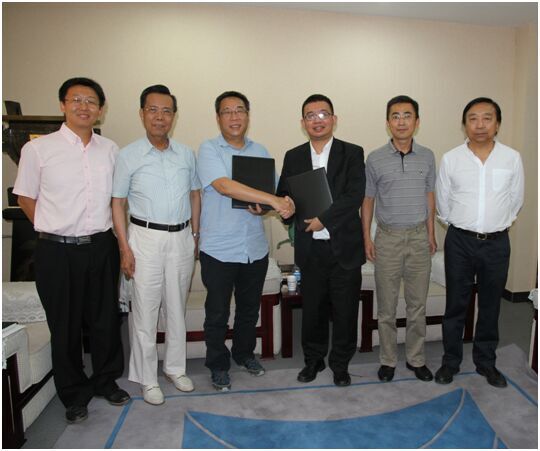Mountains are among the regions that are most sensitive to climate change and to the impacts of human activities. The Himalayan Region, characterized by the massive mountain ranges of the Himalaya, has therefore attracted wide research interest. The State Key Laboratory of Numerical Modelling for Atmospheric Sciences and Geophysical Fluid Dynamics (LASG), Institute of Atmospheric Physics (IAP), Chinese Academy of Sciences (CAS) signed a cooperation agreement with the International Centre for Earth Simulation (ICES) Foundation on 19 August, 2015 to boost research on the dynamics of the Himalayan Region. Following the agreement, an Asian Centre for Earth System Simulation (ACESS) will be established.

ICES Foundation is a Geneva-based, not-for-profit organization and the Himalaya Project is a major element in its global vision and mission. LASG/IAP has been devoted to Tibetan Plateau research since 1980s, including its impact on monsoons and climate. Both parties have agreed to collaborate and to share expertise and knowledge in ACESS such that they build value and working experience in matters relating to the Himalayan Region and its impact on weather, climate, geological, biological and socioeconomic factors throughout Asia and the rest of the world - with focus on data visualization, climate modeling, water & energy resources, and disaster risk reduction. At present the ACESS International Project Office (IPO) is located in LASG/IAP.
LASG/IAP/CAS will be primarily responsible for carrying out research and development projects in China and for leveraging its local knowledge, contacts and expertise. The responsibilities of ICES include advising ACESS in the use of advanced digital visualization techniques and implementing quality control systems of an international standard while assisting ACESS to collaborate with other members of the ICES community.
Director-General of IAP/CAS Prof. ZHU Jiang, wished the cooperation could take full advantage of both parties’ strength and develop new climate system insights for the Himalaya Project. One of four advisors of the IPO and also a CAS academician, Prof. WU Guoxiong commented that, “The signing of the project and inauguration of ACESS is a continuation of the successful collaboration between LASG/IAP and ICES as well as other international agencies in the previous stages of Tibetan Plateau research. Formation of ACESS signals a new phase of cooperation in the field”.
Dr. Robert Bishop, President & Founder of ICES indicated the importance of Himalaya and Tibetan Plateau dynamics to the entire world system and that this partnership would shed new light on the extent of their global impact.
Background:
LASG/IAP was founded in 1985 and its priority research areas include: (I) Earth System model development and application, (II) weather and climate dynamics, (III) the predictability of weather and climate, and (IV) geophysical fluid dynamics. http://www.lasg.ac.cn/
ICES is a non-profit organisation whose mission is to collate and integrate global pools of knowledge from across scientific and socio-economic disciplines and develop holistic modelling and simulation to predict the future directions and scenarios of various Earth Systems, especially those affecting climate change, extreme weather, geoengineering, resource depletion, fresh water availability, food security, public health and safety, and hazard reduction and mitigation. http://www.icesfoundation.org
"The Himalaya Project" has been conceived by ICES to improve communication and collaboration among governments, academic and commercial organizations in the 16 nations that are either bordering, exercising jurisdiction or directly impacted by events occurring in the Himalayan Region, so as to produce a unified knowledge system of the region. Such a unified knowledge system (UKS) will collate and process various data to help assess the regional and global impact of human behaviour within the area as well as to help mitigate the occurrence of natural disasters. At the same time, the UKS will help in the design and maintenance of a thriving ecological civilization throughout the region.
